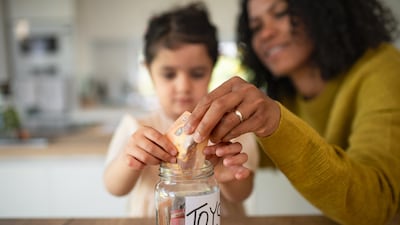Nearly 45 per cent of employees in the UAE have no plans to ensure an adequate standard of living after retirement, according to global consultancy Mercer.
Experts point out the lack of financial literacy in an average household, overspending by millennials, easy access to credit and a prevalent culture of conspicuous consumption as the main reasons for UAE residents’ inability to save.
With a staggering 675 per cent increase in the number of people over 65 years in the UAE between 2011 and 2021, according to World Bank data, there are social and economic concerns around the growing burden on public and personal finances.
Engendering a culture of saving early through financial literacy is, therefore, a social and economic imperative.
Start early
In a child's early years, parents have a golden opportunity to start the financial literacy journey.
Research by the World Economic Forum in 2019 shows that hands-on experience from mums and dads is particularly important in helping children learn the basics of money management, such as budgeting and saving.
The sooner parents introduce their children to the concept of money, the better.
Familiarisation with money skills can start with the smallest of steps — such as explaining what happens at the store checkout, showing children the receipt, and letting them hold the change.
Saving lessons
If children as young as three or four are shown what money is, they can quickly get to grips with what it is for and how exciting it is to have it.
This then sets the stage for the introduction of basic savings.
An old-fashioned savings jar gives children a fun, hands-on attachment to what it feels like to save money — they can see the pile of coins get bigger over time and learn to appreciate what they have.
Then when they’re a little older, they can learn the value of hard-earned cash by being given opportunities to earn money.
For example, Dh10 ($2.7) for washing the dishes shows that hard work pays.
Public and private sectors are also working to address the challenges related to financial planning.
In the UAE, the Ministry of Finance’s Saving Awareness initiative provides simple, step-by-step guidance on achieving financial freedom and saving for retirement.
Banks possess a unique opportunity to help young people learn that every aspect of life — where we live, what we eat, where we go to university, the clothes we wear and the holidays we take — rests on our ability to make money and manage it responsibly.
Engage with Gen Z for financial management
Deciding to take the message out into the community, Mashreq partnered with Gems Education Modern Academy to launch a financial literacy boot camp to show young people the value of financial independence.
The course provided practical, real-world experience of financial challenges and explored basic concepts such as budgeting, saving, investing, taxes, insurance and credit management. This approach creates a focus on independence for Gen Z.
Banks, therefore, should leverage financial technologies and digital platforms to engage with young people positively and creatively to create healthy financial attitudes and behaviours.
Together, parents, policymakers and banks have the tools society needs to encourage financial literacy, create personal responsibility and forge a national saving mindset.
With 2.78 million people under the age of 24 in the UAE, these goals are crucial if we are to help tomorrow’s working-age population become more financially independent.
Teaching the value of hard work and financial independence are good life skills but, perhaps more importantly, they are essential behavioural attributes that we need to create socio-economic harmony between generations.
Any organisation that takes action to make it happen — private or public — is making a vital contribution to the country’s future prosperity.
Samir Ismail Talkhani is senior vice president and head of digital consumer acquisition at Mashreq Neo

